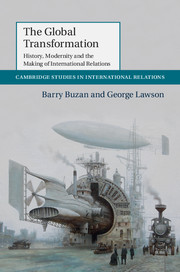Part III - Implications
Published online by Cambridge University Press: 05 February 2015
Summary
The configuration of industrialization, the rational state and ideologies of progress we have highlighted in previous chapters brought global modernity into being. It continues to serve as the basis for many aspects of contemporary international relations, shedding light on issues ranging from intervention to the changing nature of warfare. The contemporary world order is a historically specific configuration formed in the convulsions of the global transformation that became the dominant force in world politics during the nineteenth century. Future historians are likely to look back on the nineteenth, twentieth and twenty-first centuries as a single transformative period, examining the ways in which global modernity reconfigured social relations on a planetary scale. Because we make these observations from within this transformational process, it is difficult to know what conclusions future commentators will draw about when, or if, this transformation settled into a durable form. Thus while we can identify significant stages within the transformation process, we cannot say definitively whether that process is ongoing or over. The agrarian revolution took several thousand years before it settled into the classical world of city-states, kingdoms and empires that lasted for at least five millennia. The impact of the revolutions of modernity has been much quicker than previous macro-transformations. But whether they have reached a point of maturity or have instead generated a period of ‘permanent revolution’ is, as yet, unclear.
- Type
- Chapter
- Information
- The Global TransformationHistory, Modernity and the Making of International Relations, pp. 271 - 272Publisher: Cambridge University PressPrint publication year: 2015



